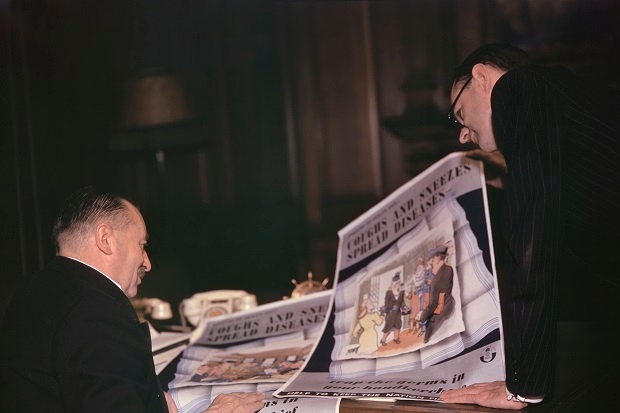For the first time in years, I thought of Tony Hancock. In the ‘Blood Donor’ episode of Hancock’s Half Hour, Hancock exits a doctors’ surgery singing the words ‘coughs and sneezes spread diseases, catch the germs in your handkerchief’ to the tune of Deutschland, Deutschland Ueber Alles. I have only seen this clip once or twice, but evidently it made a lasting impression because there it was, in my mind’s ear, on being confronted by a 1940s anti-flu poster at the British Library’s propaganda exhibition.
Propaganda: Power and Persuasion features more persuasion than power. Goebbels and Uncle Sam are represented, but do not dominate. Indeed, the curators challenge the notion that propaganda is negative or a necessary evil when at war. Space is given to numerous public health campaigns from all over the world (your starter for ten: which campaign adopted the slogan ‘Don’t Die of Ignorance’?) And the London 2012 Games and the Festival of Britain are used to show that propaganda can forge national unity and identity in times of peace.
The curators openly entertain a link between advertising, the media and political parties in the great struggle for the public’s attention, votes and wallets; a struggle in which information is both a coercive and a persuasive tool. The show, then, doubles as a history of mass media and ‘spin’. It concludes that we’re entering a new epoch in which social media and micro-technology are rendering propaganda and message control obsolete.
The show’s only weakness is that it doesn’t ask if the old schemes succeeded. To be fair, passing such a judgment would be tricky because many campaigns had unspecific aims. ‘Dig for Victory’ is now thought to have made a negligible contribution to the war effort, but it did boost morale through the dark days of 1940-2. It must have been clear to the government that the nation could not live by allotments alone, so was the purpose of the campaign to be seen to be proactive at a time of crisis? If so, was such propaganda truthful?
This is why I was reminded of Tony Hancock’s ‘coughs and sneezes’ joke as I segued from Dr Goebbels’ Total War to Nye Bevan’s NHS. The conceited Englishman finds propaganda campaigns – and the officious goons who conduct them – slightly laughable and perhaps a little bit sinister; the sort of caper at which foreigners who are ‘ueber alles’ excel. This exhibition doesn’t quite manage to make propaganda a cleaner word, but that’s no reason not to see it before it closes on 17th September. I saw it two months ago and the memory of it remains bright.






Comments